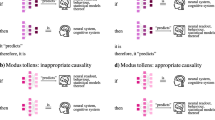Abstract
Soames's new theory of "cognitive propositions" is presented and several prima facie objections are presented to it.
Similar content being viewed by others
Notes
I’m being very sloppy here in my use of ‘φ’. If Jane predicates doghood of Fido, we can’t say that Jane is entertaining the proposition that Fido is doghood; we have to say instead that she’s entertaining the proposition that Fido is a dog. I trust, however, that I can be understood without going into the spiel that would be needed in order for me to use a sentence that really does require me to say what I’m confident my sloppy use of words conveys.
Author information
Authors and Affiliations
Corresponding author
Rights and permissions
About this article
Cite this article
Schiffer, S. Cognitive propositions. Philos Stud 173, 2551–2563 (2016). https://doi.org/10.1007/s11098-016-0634-2
Published:
Issue Date:
DOI: https://doi.org/10.1007/s11098-016-0634-2



